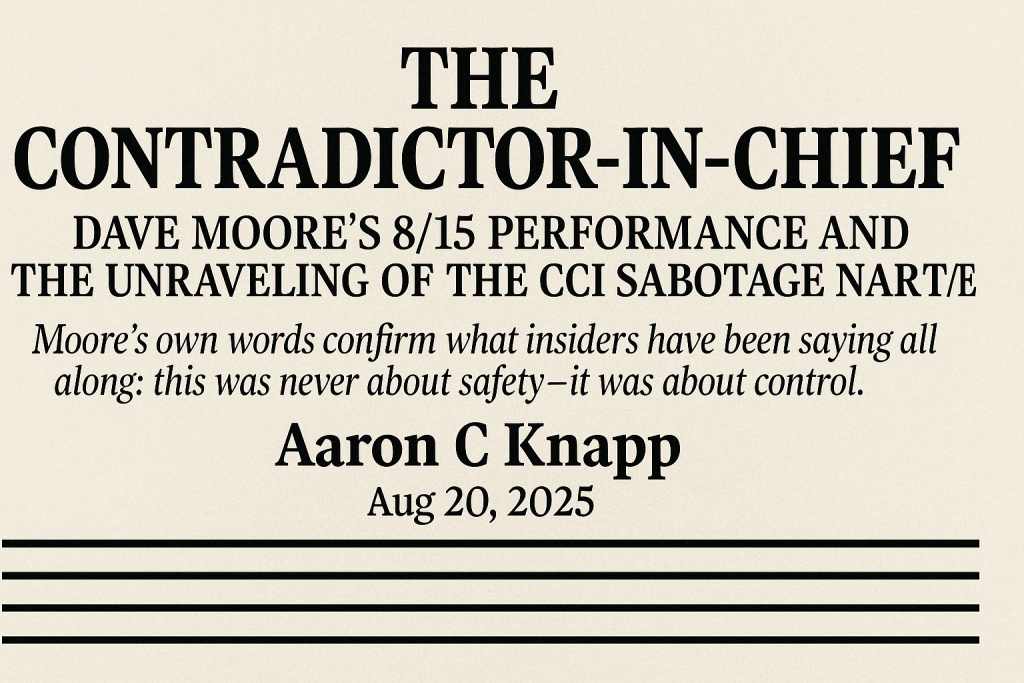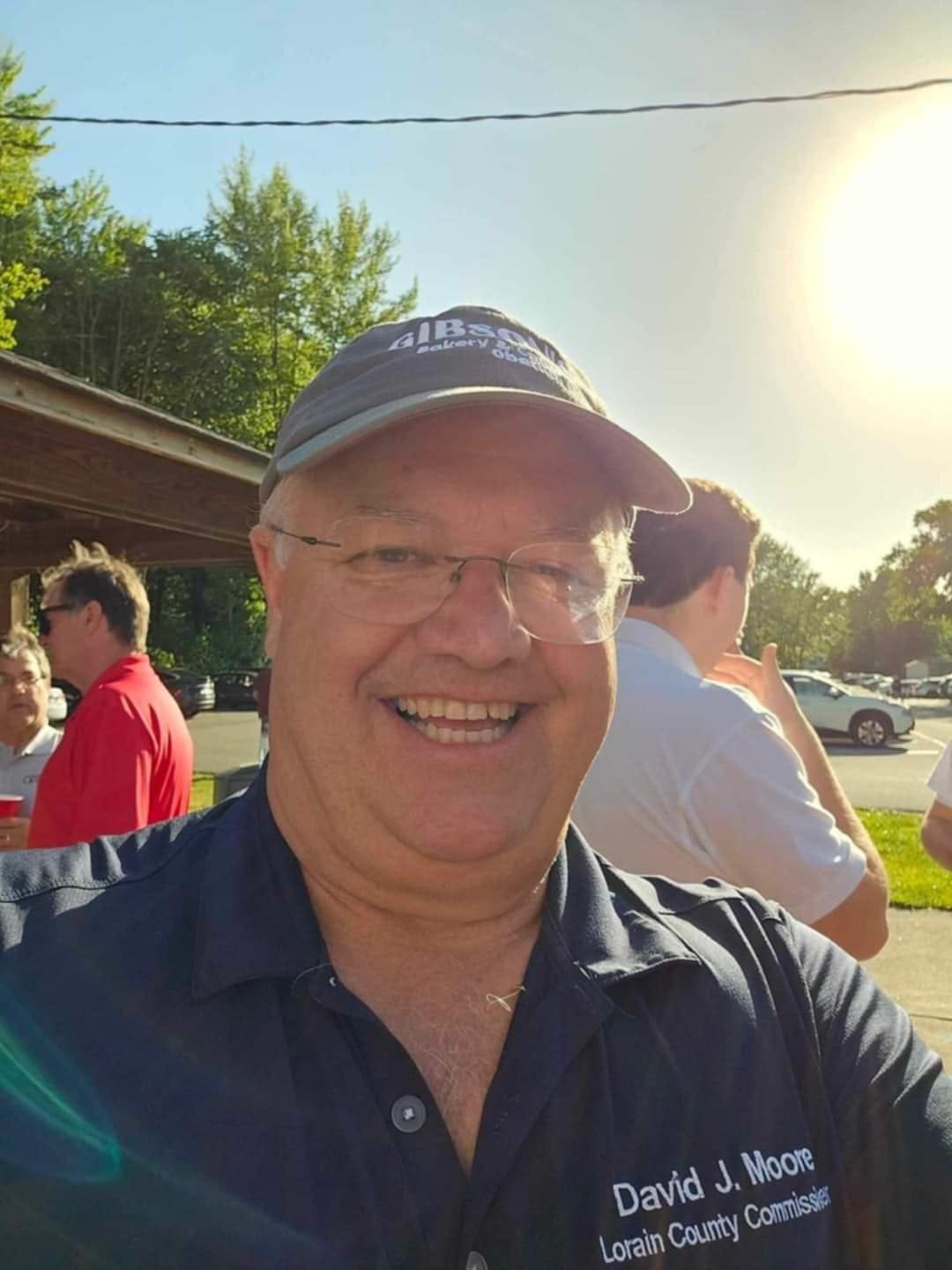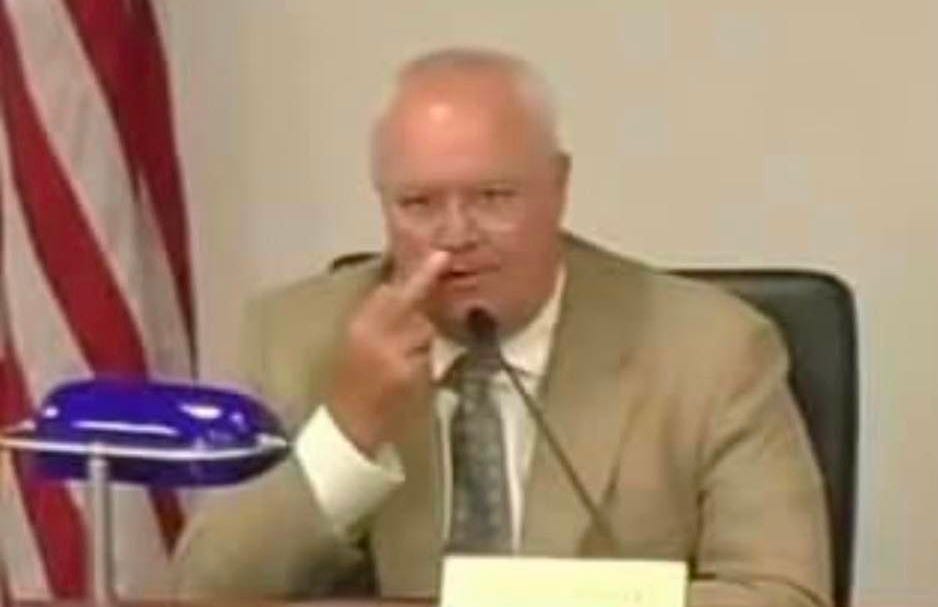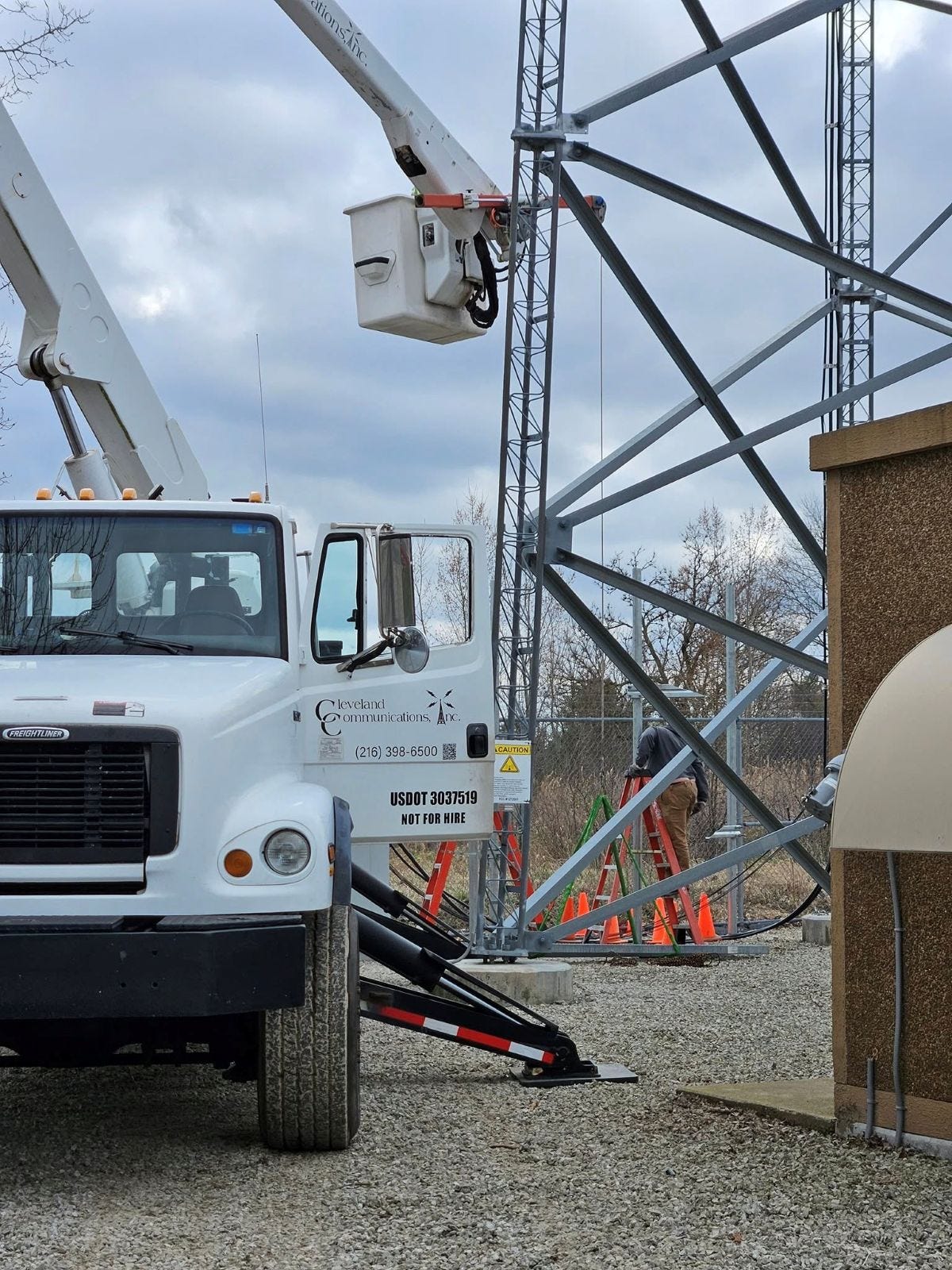The Contradictor-in-Chief: Dave Moore’s 8/15 Performance and the Unraveling of the CCI Sabotage Narrative

Moore’s own words confirm what insiders have been saying all along: this was never about safety—it was about control.
Aug 20, 2025
I. Four Years

of Backpedaling—Now on the Record
“This is not prepared. This is just me sitting up here after Brian brought it up in his public comments.” — Commissioner Dave Moore, August 15, 2025
Commissioner Dave Moore’s comments at the August 15 Commissioners meeting were framed as spontaneous, but they read like a long-delayed damage control operation. After years of scripted attacks, contract cancellations, press leaks, and manufactured outrage over the CCI radio contract, Moore finally tried to reframe the entire narrative. The problem is, his own words now contradict everything he’s been saying since 2022.
At the height of the controversy in 2023, Moore and fellow commissioner Jeff Riddell repeatedly alleged that the original CCI deal was “rigged,” “steered,” and possibly illegal. They implied it was a sweetheart deal handed to a vendor without proper oversight. Riddell went as far as to suggest it was under state-level scrutiny. Moore, meanwhile, fed the same line to press contacts, first responders, and even state officials. The implication was always that the entire CCI project—not just the radios—was tainted.
But on August 15, Moore changed his tune:
“The contract that Jeff Redell and I rescinded has nothing to do with what we did. We rescinded buying 1,049 radios at $5,800 apiece.”
Suddenly, the issue wasn’t the infrastructure, the tower leases, the network management, or the long-term sustainability of the system—it was just the price tag on radios. That’s a convenient pivot for a board now under federal scrutiny, facing allegations in a RICO case, and being called out by their own constituents. It’s also false.
The resolution Moore and Riddell rescinded in 2023 was not limited to radios. The full documentation shows it was part of a broader purchase order with Communications Consulting, Inc. (CCI), whose proposal included infrastructure build-out, tower integration, and long-term maintenance. And while Moore now frames the cost as excessive, the CCI deal also included network ownership, system upkeep, and a guaranteed savings structure compared to state MARCS fees. That’s the part he leaves out.
More importantly, Moore’s 2025 version of events directly contradicts the narrative he weaponized to kill the deal. If it was just about overpriced radios, why did he and Riddell allege political corruption, state-level interference, and demand contract termination “for cause”? Why did they circulate no-bid letters from Motorola and partial bids from Vasu as if they proved impropriety—when in fact they proved there was interest, competition, and a bidding process?
The only thing that’s changed is the political calculus.
Now that Moore is back in office and Riddell squeaked through reelection, the urgency to attack CCI has cooled—but the paper trail remains. And Moore, despite his attempt to reframe the contract as a misunderstanding over hardware costs, can’t scrub the public record of two years’ worth of vendetta-driven policy decisions.
What we’re witnessing isn’t transparency. It’s a cover story. One hastily rolled out in response to public comment and media pressure—one that Moore hopes will rewrite the very history he authored. But the facts, the resolutions, and the emails don’t lie. He does.

II. “We Built It. Use It If You Want”—But Did They Also Block the Exit?
“We built it. We put the road in. You can drive on it if you want.” — Commissioner Dave Moore, August 15, 2025
That’s the line Moore used to defend the board’s $28 million MARCS infrastructure switch—an infrastructure, he claimed, that gives every public safety agency in Lorain County the “freedom” to choose whichever radio vendor they prefer. But like most things Moore says when he’s under scrutiny, that freedom isn’t what it appears to be.
What Moore didn’t disclose in the meeting—and what internal emails and sourcing suggest—is that the Commissioners intentionally restricted CCI’s ability to use the county’s tower infrastructure after the original contract was rescinded. According to documentation your source provided, a clause was quietly added to county tower agreements that effectively blocked co-use or leasing by CCI. The clause didn’t exist in the original tower terms. It was amended after the fact—specifically to exclude a competitor.
That’s not “choice.” That’s a forced monopoly, engineered under the pretense of public safety.
Worse still, Moore and Riddell appear to have anticipated that CCI might seek alternate sites to maintain its network. Internal correspondence tied to the MCM consulting firm—who were brought in under the Moore-Riddell regime—identified the LCCC tower near the 911 center as a potential backup site CCI could use if excluded from county infrastructure. That’s when the real interference appears to have begun.
On May 20, 2025, the Lorain County Commissioners appointed Lee Armbruster—the wife of County Administrator Jeff Armbruster—to the LCCC Board of Trustees. The timing is suspect. And when CCI approached LCCC about potentially leasing space on the tower, a member of the college reportedly replied: “We’re unsure of what we can do, and we’re afraid of the political ramifications because of one of our board members and her connections to county government.”
The name Armbruster didn’t need to be said. It was already understood.
That fear alone—of political retaliation from county commissioners or their administrative appointees—compromised the independence of a public education institution. And it proved what many have suspected since this battle began: that this was never about interoperability or safety. It was about cutting CCI off from every possible avenue to survive.
Moore went on to say:
“If they want to participate, great. If they don’t want to participate, that’s fine.”
But participation in what? A network they no longer control? A tower they can’t access? A policy that was re-engineered to drive them out of the market?
When you block a company from using public infrastructure, strong-arm local institutions into silence, and then frame their demise as a “choice,” it’s not public policy. It’s retaliation—plain and simple.
Even Moore’s language betrays that reality. In the same breath, he called the conflict a “civil separation,” noting that CCI, the Prosecutor, and the Sheriff were “working it out.” That’s not how civil litigation or contract enforcement works. That’s how backroom political pressure works. That’s how you quietly kill a competitor and call it consensus.
What happened to CCI wasn’t just a business casualty. It was a targeted takedown, orchestrated through board appointments, contract amendments, and institutional intimidation.
And no matter how many times Moore claims the public can “drive on the road” they built, he forgets to mention all the signs they posted saying “Do Not Enter—Unless You Pay the State.”

III. L3 Harris Didn’t Bid? Or Was the Field Rigged?
“L3 Harris did not bid.” — Commissioner Dave Moore, August 15, 2025
That’s how Moore tried to explain away the county’s rejection of the CCI contract—by claiming no one else was in the game. If you take him at his word, the commissioners were forced to rescind the 2023 resolution because they had no other choice: the county had only one vendor on the table, and they needed to go back out to bid.
But that claim doesn’t hold up to scrutiny—because it conveniently erases everything that happened during the procurement process, and everything that came through the hands of MCM Consulting, the county’s own hired expert.
Multiple public records and internal sources confirm that Motorola submitted a formal no-bid letter, a standard procedural move indicating that while the company declined to submit a complete proposal, it remained interested and available for partnership. Vasu Communications, a regional competitor and frequent government vendor, submitted a partial bid tied to specific hardware and communication services. Most significantly, MCM rated CCI’s proposal at 97 percent compliance with the county’s own request for proposals. That is not failure. That is near-total compatibility with the stated goals of the county’s radio transition.
Moore’s “L3 Harris didn’t bid” statement is not only misleading—it’s dishonest. While it’s technically true that the L3 Harris corporation didn’t submit a bid directly, that claim is a red herring. The bid didn’t have to come from corporate headquarters. CCI, a certified L3 Harris dealer and integration firm, submitted a full proposal that included L3 Harris equipment, build-out of a new countywide network, training, and long-term maintenance. Moore knows this. He knew it in 2023 when he voted to rescind the contract. He knows it now.
What Moore and Commissioner Marty Gallagher have done is construct a false binary—one that suggests a legitimate competitive process didn’t exist. The only way that works is by ignoring the actual structure of vendor relationships in this industry. Large technology manufacturers like L3 Harris often work through certified integrators and partners for projects of this nature. That is the norm, not the exception. CCI wasn’t just some middleman. It was the delivery system.
Despite this, Gallagher joined Moore in pushing the same narrative minutes later, stating, “The rescinding of that contract was a single bid contract.” That statement, made for the record, is false. It erases Vasu’s bid. It omits Motorola’s no-bid letter. It pretends the 97% compliance score never existed. It suggests that the commissioners acted in a vacuum, rather than a coordinated political maneuver to kill a deal they never liked.
Moore’s effort to downplay the controversy also reveals how his story has changed over time. In 2023, the argument wasn’t about bid quantity—it was about bid integrity. Moore and then-Commissioner Jeff Riddell cast suspicion on the entire CCI proposal, implying that it had been steered, manipulated, or influenced behind closed doors. They sent inflammatory accusations to the State Auditor’s Office. They briefed reporters. They gave public comments alleging wrongdoing without offering evidence. That talking point was central to their effort to tank the contract.
Now that those claims have been quietly discredited, Moore is rewriting the history. The problem, according to him, was never that CCI was corrupt—it was that no one else showed up. But the record says otherwise. The field was never empty. It was just narrowed, massaged, and distorted until it suited the outcome Moore and Gallagher wanted.
At the heart of this revisionist defense is a deeper concern. The federal lawsuit now pending against the County by CCI doesn’t just allege breach of contract. It alleges intentional interference. It suggests that the commissioners engineered a process to fail—and then smeared the contractor when it didn’t. The complaint accuses them of manipulating the record to favor the Ohio MARCS system and bury the CCI partnership permanently.
The deposition phase of that lawsuit will likely ask hard questions Moore tried to brush aside on August 15. Was the decision to rescind the contract based on political pressure? Did Moore and Riddell make knowingly false claims to state agencies or the press? Did they rely on manufactured doubts to cover a preference for a state-run system? And was the entire bidding field misrepresented—on purpose—to justify a shift that was already decided?
Moore can keep saying “L3 Harris didn’t bid.” But repetition doesn’t make it true. What it does is signal desperation—an attempt to escape the consequences of a narrative collapsing in real time. The truth, long buried under spin, is now clawing its way back into the public record. And Moore, for all his backpedaling, can’t run from that deposition forever.
IV. Who’s Afraid of a Deposition?
“We’ve heard nothing from them.” — Commissioner Dave Moore, August 15, 2025
The claim, again, is that there’s no real legal problem. That CCI—despite filing a federal lawsuit and triggering outside counsel retention—is somehow not pursuing anything at all. Moore’s line that “we’ve heard nothing from them” is as deceptive as it is strategic. He wants the public to believe this is a dead issue, that there’s no pending liability, no serious claims, and no risk to the County’s reputation or finances. But the truth, plainly visible in the court docket and attorney records, tells a very different story.
The CCI lawsuit is real. Filed in federal court, it alleges that the Lorain County Board of Commissioners—under Moore, Gallagher, and former commissioner Jeff Riddell—intentionally torpedoed a lawfully awarded contract, spread defamatory claims to law enforcement and the media, and abused their public office to favor a competitor: the state-run MARCS system.

The complaint details not just breach of contract, but a pattern of bad-faith conduct. CCI’s team contends that they were guaranteed a path forward in 2023, only to be blindsided by a coordinated political campaign designed to destroy their credibility and remove them from the equation. The lawsuit seeks damages. Substantial ones. And it’s not going away.

So when Moore stood at the dais on August 15 and said, “We’ve heard nothing from them,” it wasn’t a statement of fact. It was a performance. A way to delay accountability, minimize public awareness, and control the narrative just a little longer. But that clock is ticking.
Depositions are coming. Discovery will open. And when it does, Moore’s own emails, texts, notes, and recorded conversations—those made in public and those he thought were private—will all be subject to subpoena. That includes his correspondence with Riddell, Gallagher, County Administrator Tom Williams, and anyone else involved in the contract’s reversal. It also likely includes communications with the State Auditor, law enforcement agencies, and even media contacts if they were part of an effort to push a false narrative.
What happens when Moore is asked, under oath, whether he had any documentation or evidence that the CCI contract was improperly steered?
What happens when Gallagher is asked if he had independent knowledge of the facts, or merely repeated what Moore told him?
What happens when subpoenaed communications show that key players were pushing for MARCS even before the CCI contract was cancelled?
And perhaps most importantly—what happens when those depositions contradict the statements Moore just made for the record on August 15?
Because they already do.
Moore claimed the contract was rescinded purely because it was a single bid. That’s not what he said in 2023. Moore claimed they’ve “heard nothing” from the vendor. That’s not what the court record shows. Moore claimed the County acted properly, and that no harm has come to anyone. That’s not what the lawsuit alleges—and it’s not what the evidence is likely to reveal.
He can’t spin his way out of sworn testimony. He can’t coach himself through a deposition. When the questions come, they will come with documents, with timelines, with corroborating exhibits that leave no room for improvisation. And unlike a county meeting, Moore won’t be able to filibuster or lean on Marty Gallagher to echo him. The law doesn’t play that game.
Nor should the public.
The costs of this lawsuit—financial, reputational, and operational—will be borne not by Moore personally, but by Lorain County residents. By taxpayers. And all because the Board’s leadership couldn’t admit they lost control of the process and tried to shift blame onto a private vendor who followed the rules. Now, after years of spinning, Moore will have to do something he’s carefully avoided since 2021: answer real questions under real legal pressure.
There’s a reason he’s nervous. There’s a reason he’s backpedaling. And there’s a reason the word “deposition” sends a shiver through the halls of county government. Because the truth is no longer optional. It’s coming—with subpoenas, transcripts, and consequences.

V. MARCS by Force—Not by Consensus
Commissioner Dave Moore wants you to believe this was about consensus. About compromise. About meeting the needs of first responders.
It wasn’t.
It was about power. And it still is.
The record shows that the decision to move Lorain County to the MARCS system was neither driven by local demand nor backed by unanimous expert support. In fact, the opposite is true. As of 2023, nearly every fire chief and police chief consulted—including those who publicly spoke during commissioner meetings—favored CCI’s hybrid, locally controlled digital radio network. That system, unlike MARCS, would have required zero taxpayer dollars for infrastructure. CCI planned to own and maintain the network itself, much like a cellular carrier builds its towers and recovers the cost through service plans.
Commissioner Moore’s new position is that the rescinded contract was merely for radios—not infrastructure. But the March 2023 resolution to rescind the CCI purchase order was sold to the public and to the press as a full unraveling of the CCI contract. Moore himself warned of potential “steering,” “favoritism,” and “corruption”—none of which was ever substantiated. In fact, the State Auditor’s Office and federal investigators both reviewed the procurement process and found no wrongdoing. Yet Moore, Riddell, and Gallagher pressed on, citing unspecified legal concerns and political optics.
They never explained what changed. They never admitted they were wrong. They simply handed control of Lorain County’s emergency communications to the State of Ohio—and they’re calling that a win.
Worse still, they did so while burying the financial consequences. The MARCS system now requires every local agency to pay user fees—estimated to exceed $750,000 annually for the county alone. Cities like Elyria, Amherst, Sheffield Lake, and Avon are being forced to retrofit systems, replace dispatch equipment, and pay per-radio access costs that were never part of the original CCI plan.
And let’s not forget: CCI’s system was already under construction. Towers were being erected. Radios were ordered. The contract was active. And then—political panic.
By the time Moore and Riddell reversed course in 2023, CCI had already sunk considerable capital into building a public safety-grade network based on their bid—one that won based on a 97% technical match to the RFP, unlike Motorola (which submitted a no-bid letter) and Vasu (whose proposal was deemed partial and unresponsive).
This wasn’t about the best system. It wasn’t about savings. It was about severing a deal that had become politically radioactive in the wake of internal power shifts and election-year optics. Now, Moore’s “regionalism” talking points ring hollow—especially as local agencies quietly explore creating sub-regional 911 collaborations just to avoid MARCS dependency.
In the end, the only consensus forged was among the commissioners themselves—overriding experts, ignoring the procurement scorecard, and throwing millions of taxpayer dollars into a statewide system that local responders never asked for.
VI. The Lawsuit Is the Truth Serum
For all the spin, deflection, and revisionist history on display on August 15, the facts remain—and soon they’ll be sworn under oath.
Commissioner Dave Moore may have hoped that his sudden change in tone would help him regain control of the narrative. But the lawsuit filed by CCI isn’t a press release. It’s a freight train of accountability. And no matter how many public statements Moore delivers from the dais, none of them will matter when he’s sitting across from opposing counsel with a transcript recorder running.
Because in court, there are no backpedals. There are no redactions. There is no cutting off public commenters or reframing the debate mid-sentence. There is only the record—and the consequences of contradicting it.
That record shows a far different story than the one Moore attempted to tell on August 15. It shows a deliberate effort to sabotage a functioning, independently-built emergency communications network. It shows a coordinated media and political campaign to discredit CCI—despite the fact that no criminal investigation was ever initiated, no wrongdoing ever substantiated, and no procurement laws ever violated. And it shows a Board that didn’t course-correct after being cleared by the State Auditor, but instead doubled down on its conspiracy theories, manufacturing a justification to ram through an overpriced shift to MARCS.
The discovery process in that lawsuit will force open the very black box Moore and his allies have tried to seal. It will document who wrote the resolution rescinding the CCI purchase order and under whose direction. It will trace the timing and content of communications between the commissioners and competing radio vendors or Motorola lobbyists. It will subpoena procurement scoring records that the Law Department refused to release to the public. And it will raise a critical fiscal question: why did this Board push through a multi-million-dollar MARCS system when they had every reason to know it would cost taxpayers more—and deliver less?
These are not rhetorical questions. They are now legal ones. And Moore will not be able to answer them with another monologue. He’ll have to answer them with sworn testimony.
That’s why the lawsuit matters. It strips away the spin and forces a reckoning with the facts. It cuts through the fog of misdirection and demands a timeline. And for Moore, Riddell, Gallagher, and anyone else involved in the 2023 collapse of Lorain County’s independent radio system, that reckoning is no longer political—it’s judicial.
There’s a reason Moore tried to reframe the narrative on August 15. He sees what’s coming. The depositions. The interrogatories. The evidence he can’t redact or deny. And if this really was all above board, if there was nothing to hide, the question is obvious:
Why did they try so hard to bury it?
Final Thought: The Microphone Is Not a Shield
Commissioner Dave Moore stood before the public on August 15 and tried to rewrite history with the confidence of a man who’s never had to testify under oath. But unlike the dais, a deposition doesn’t come with a gavel to hide behind or the luxury of an audience that doesn’t get to reply. In court, your words follow you—and lies don’t get second readings.
For two years, Moore, Riddell, and Gallagher peddled a narrative that CCI’s contract was shady, that something nefarious had gone on behind the scenes, that taxpayers had been duped. They pushed that fiction so hard that it helped drive CCI out of the county—only for the same officials to pivot months later and admit, publicly, that the rescinded contract was merely about radios. Infrastructure? Never in question, Moore now says. Procurement? Never disputed. The very things they spent months insinuating were corrupt were, apparently, fine all along.
This isn’t just backpedaling. It’s intellectual dishonesty on a government salary. And the public deserves better.
The truth is catching up. The lawsuit Moore tried to downplay is moving forward. Depositions are coming. Paper trails are being followed. The same men who once demanded an audit will now face one under penalty of perjury. And no matter how many public statements Moore gives, none of them will override the record he already helped create.
You can’t redline reality in retrospect. You can’t reframe the facts when they’re attached to sworn affidavits. And when the courtroom lights turn on, the very microphone Moore once used to distort the truth will become the spotlight that reveals it.
Let’s hope he’s prepared. Because we are.
Disclosure
This article is based on a combination of public records, verified reporting from mainstream and local outlets, court filings, video footage, and firsthand documentation obtained through official requests and confidential sources. Statements attributed to public officials, including Commissioners Dave Moore, Jeff Riddell, and Marty Gallagher, are drawn directly from recorded meetings and public statements. Certain allegations regarding tower lease amendments, scoring rubrics, and influence by outside actors are based on whistleblower communications and remain under investigation.
Aaron Knapp is an investigative journalist, licensed social worker, and candidate for Lorain City Council. He has filed multiple public records requests and legal complaints related to the matters discussed herein. This disclosure is made in the interest of transparency and accountability.
Legal Disclaimer
This newsletter article is based on publicly available records, official county meeting transcripts, and verified documentation. The opinions and commentary provided are intended for journalistic and informational purposes, grounded in the protections afforded by the First Amendment of the U.S. Constitution and Article I, Section 11 of the Ohio Constitution (which affirm freedom of speech and press) ficlaw.comlaw.justia.com+1. All individuals referenced are presumed innocent unless proven guilty in a court of law—a legal principle firmly enshrined in Ohio criminal procedure codes.ohio.gov. Any errors identified will be addressed and corrected as warranted.
© 2025 Aaron C. Knapp / Lorain Politics Unplugged. All rights reserved.





2 thoughts on “The Contradictor-in-Chief: Dave Moore’s 8/15 Performance and the Unraveling of the CCI Sabotage Narrative”